Palm oil
Hi guys and good evening from where ever you are. Today I want to talk about palm oil production in my country Nigeria. Just sit back, relax and enjoy the cool ride.
Palm oil is a type of edible vegetable oil that is derived from the fruit of oil palm trees. This oil is widely used in the food industry, as well as in various non-food industries such as cosmetics and cleaning products. This oil product has lots of uses and it's good that I share them with you today.
Palm oil is highly versatile, very very versatile,, and efficient crop, as it requires less land and resources to produce compared to other vegetable oils.
But also, the production of palm oil has been associated with so many environmental and social issues, such as deforestation, habitat destruction for endangered species, and exploitation of workers.
In order to get good yield in palm oil production, we have to stay away from such degrading practices mentioned above. This is something that is also in use, every single day. Most especially in Africa, and particularly in Nigeria, palm oil is a product that has great percentage of daily usage.
Palm oil production in the world
Palm oil is one of the most widely produced and traded vegetable oils in the world. This is clear you know! Everyone needs palm oil. Palm oil production is something that can't be underestimated, as so many countries today have their own way of producing the oil.
Most Production of palm oil production happens in tropical regions, primarily in Southeast Asia, with Indonesia and Malaysia being the two largest producers. When it comes to palm oil production in Malaysia, I was told that Malaysia got some of their palm nut (palm fruits) from Africa some years ago to start their own plantation, but today, Malaysia is ranked amongst the most successful palm oil producing countries.
Other major palm oil producers include Thailand, Colombia, and Nigeria, although their production levels are significantly lower than Indonesia and Malaysia. In recent years, there has also been an increase in palm oil production in Africa, particularly in countries such as Cote d'Ivoire, Ghana, and Cameroon.
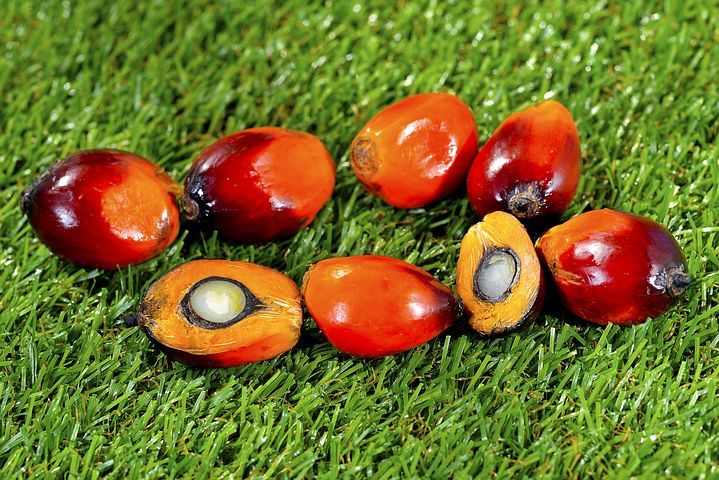
source: pixabay
Production of palm oil in Nigeria
Nigeria is one of the major producers of palm oil in Africa, although its production levels are relatively low compared to the leading producers, Indonesia and Malaysia. Honestly if you ask me, Nigeria should have been the top producing country in terms of palm oil production.
Unfortunately in my country, we don't take agriculture as serious as other nations. We only produce large quantity of some farm products due to our population, not because we take it serious, or because our government supports our farmers.
Palm oil production in Nigeria is mainly concentrated in the southern part of the country, particularly in states like Cross River, Akwa Ibom, Delta, Rivers, and Edo. Smallholder farmers account for the majority of palm oil production in Nigeria, with the crop often grown on family-owned farms and processed using traditional methods.
However, despite Nigeria's potential for palm oil production, the industry has faced various challenges, including low productivity, poor infrastructure, and inadequate government support. Exactly what I was saying above. No government support.
In recent years, there have been efforts to revitalize the industry through initiatives such as the Presidential Initiative on Palm Oil, which aims to increase domestic production and reduce imports. But nothing happened. They just bring up a nice idea then lock it up.
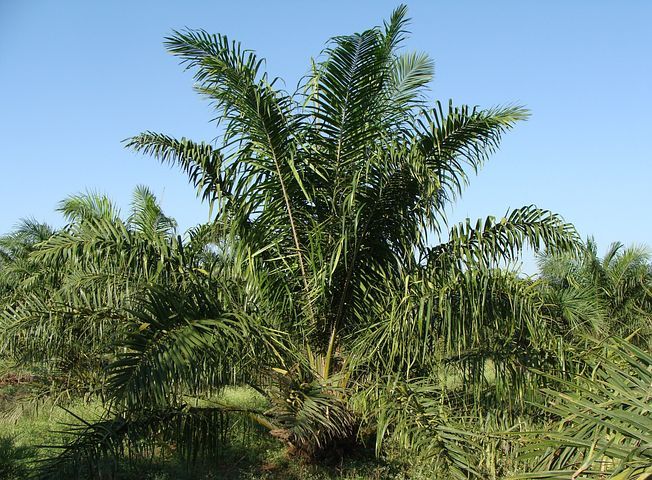
source: pixabay
Nutrients gotten from palm oil
Palm oil is a rich source of nutrients, including:
Vitamin E: Palm oil is one of the richest sources of vitamin E, a good antioxidant that helps protect cells from oxidative damage.
Carotenoids: Palm oil contains carotenoids, including beta-carotene and lycopene, which helps to reduce chronic diseases such as cancer and cardiovascular disease.
Squalene: Palm oil contains squalene, a compound that has been shown to have anti-inflammatory and anti-cancer properties.
Phytosterols: Palm oil contains phytosterols, which are plant-based compounds that have been shown to help lower cholesterol levels and reduce the risk of heart disease.
Medium-chain triglycerides (MCTs): Palm oil contains medium-chain triglycerides (MCTs), which are a type of healthy fat that can be quickly converted into energy by the body.
Also, we should know that palm oil is high in saturated fat, which can increased risk of cardiovascular disease. It is recommended we eat palm oil in good amount and as part of a balanced diet.
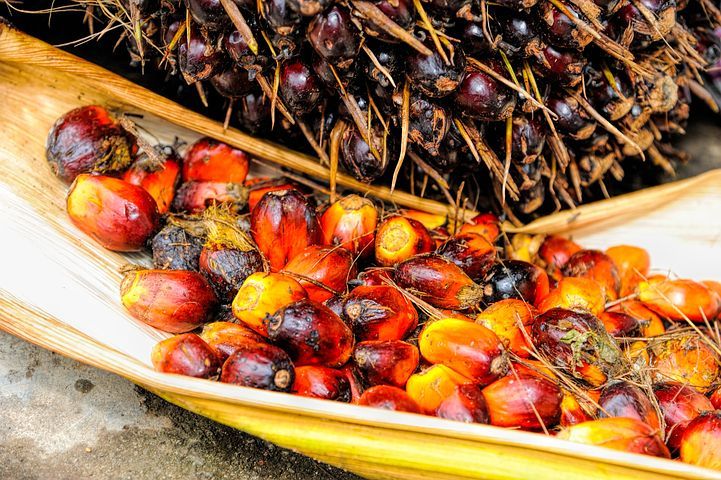
source: pixabay
States in Nigeria with high palm oil production
Palm oil production in Nigeria is mostly produced in the southern part of the country, particularly in the following states:
Akwa Ibom: Akwa Ibom state is one of the leading producers of palm oil in Nigeria, with vast plantations and numerous smallholder farms. The state government has also implemented initiatives to promote sustainable palm oil production and increase productivity.
Cross River: Another neighbouring state, Cross River state is another major producer of palm oil in Nigeria, with a long history of palm oil cultivation and processing. The state government has established a palm oil processing factories to promote investment and growth in the industry.
Delta: Delta state is home to a significant number of oil palm plantations and processing mills, making it a key producer of palm oil in Nigeria. The state government has also implemented policies to support smallholder farmers and increase productivity.
Rivers: Rivers state is a major producer of palm oil in Nigeria, with vast plantations and processing facilities.
Edo: Edo state has a long history of palm oil production and is home to numerous smallholder farms and processing mills.
Other states in Nigeria with significant palm oil production include Bayelsa, Abia, Imo, and Ondo state.
Local process of producing palm oil in Nigeria
Palm oil production in Nigeria is locally carried out by farmers and local communities using traditional methods. The following are general steps involved in the local process of producing palm oil in Nigeria:
Harvesting: Fresh palm fruits are harvested from the palm trees using long poles or by climbing the trees. The fruits are collected in baskets or sacks and taken to the processing site.
Sterilization: The fruits are boiled in water or placed in a steaming chamber to soften the flesh and loosen the oil-bearing cells.
Stripping: The sterilized fruits are then stripped of their outer layers to reveal the palm nuts, which are the source of palm oil.
Extraction: The palm fruit/flesh are then pounded into a paste. The paste is then mixed with water to separate the oil from the kernel.
Heating: The oil-water mixture is then heated in a large pot or drum over an open fire to evaporate the water and concentrate the oil.
Separation: The concentrated oil is then separated from any remaining water or solids using a sieve or a cloth filter.
Storage: The final product, which is unrefined palm oil, is then stored in containers such as jerry cans or drums until it is ready for consumption or sale.
This very traditional method can be labour-intensive and time-consuming, and the quality of the oil can vary depending on the processing conditions.
However, there are efforts to promote modern, mechanized methods of palm oil production that are more efficient and produce higher-quality oil. We hope for it someday. This will help us a lot you know.
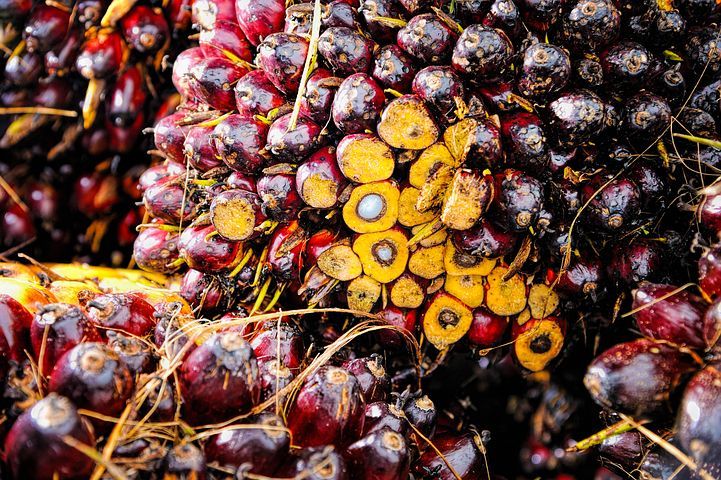
source: pixabay
Why is it important in our bodies?
Palm oil is important in our bodies because it provides a range of essential nutrients and health benefits. Here are some reasons why:
Energy: Palm oil is a rich source of calories and healthy fats, making it a good source of energy for the body.
Vitamin E: Palm oil is one of the richest sources of vitamin E, a powerful antioxidant that helps protect cells from oxidative damage. I mentioned this one already above.
Carotenoids: Palm oil contains carotenoids, including beta-carotene and lycopene.
Improves Nutrient Absorption: Palm oil contains carotenoids and vitamin E, which helps to improve the absorption of fat-soluble vitamins like A, D, E, and K.
However, it is good that we consume palm oil in small amount and as part of a balanced diet because it is high in saturated fat, which I have already explained above.
Palm oil producing countries in Africa
Palm oil production is an important agricultural activity in many African countries, and the continent is home to several major palm oil producing nations.
Some of the top palm oil producing countries in Africa include:
Nigeria: Nigeria is the largest producer of palm oil in Africa, and the third largest producer in the world after Indonesia and Malaysia. The country has a long history of palm oil cultivation and processing, and the industry provides employment for millions of people.
Côte d'Ivoire: Côte d'Ivoire is one of the largest producers of palm oil in Africa, with the industry contributing significantly to the country's economy. The government has implemented policies to support the growth of the industry and increase productivity.
Cameroon: Cameroon is a major producer of palm oil in Africa, with the industry concentrated in the southern and western regions of the country. Their government has also implemented initiatives to promote good palm oil production and increase exports.
Ghana: Ghana is a significant producer of palm oil in Africa, with the industry dominated by smallholder farmers and local communities.
Liberia: Liberia is a growing producer of palm oil in Africa, with significant investment in the industry in recent years.
Other African countries with significant palm oil production include Democratic Republic of Congo, Gabon, Angola, and Sierra Leone.
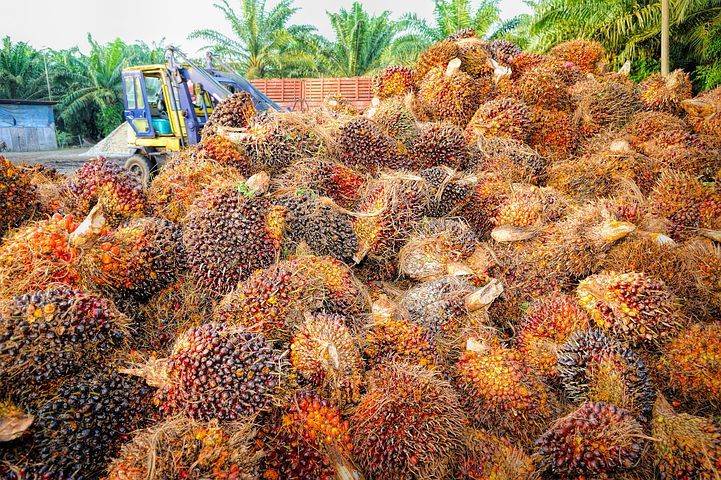
source: pixabay
Palm oil uses
Palm oil has a wide range of uses, including:
Food: Palm oil is used extensively in the food industry as an ingredient in cooking oil, margarine, shortening, and processed foods such as baked goods, snacks, and ready-to-eat meals.
Personal care products: Palm oil is used in a lot of personal care products such as soap, shampoo, and cosmetics, due to its moisturizing properties and ability to form a stable lather.
Biofuels: Palm oil is used as a feedstock for the production of biodiesel, a renewable alternative to fossil fuels.
Industrial applications: Palm oil is used in a lot of industrial applications such as lubricants, greases, and surfactants, due to its stability and high melting point.
Animal feed: Palm kernel cake, a byproduct of palm oil processing, is used as a source of protein and energy in animal feed.
While palm oil has many uses, its production also have a lot of shortcomings, but efforts are underway to promote sustainable palm oil production practices that reduce the negative impacts of the industry.
Banga soup in Nigeria
Banga soup, also known as palm nut soup, is a popular dish in Nigeria, particularly in the southern parts of the country, where palm trees are abundant. The soup is made from the juice extracted from palm nuts, which is cooked with meat or fish, vegetables, and spices.
Now read, here's a basic recipe for banga soup:
Ingredients:
These ingredients were from my top chef, yours can be different.
1 kg palm fruit pulp (banga)
500 g meat or fish (beef, goat meat, chicken, fish, or seafood)
2 onions, chopped
2 scotch bonnet peppers(atarodo), chopped
2 tablespoons crayfish
2 stock cubes
Salt to taste
Vegetables (optional)
Oya follow my instructions:
Wash the palm fruit pulp and place it in a pot. Add water and boil for about 45 minutes to an hour, or until the fruit is soft.
Allow the fruit to cool, then pound it to extract the juice. Strain the juice and set it aside. Keep reading.
In a separate pot, cook the meat or fish with the onions, pepper, stock cubes, and salt. If using seafood, add it towards the end of the cooking process.
Once the meat or fish is cooked, add the palm nut juice to the pot. Leave it to boil, then reduce the heat for about 20-30 minutes.
Add the crayfish and any other vegetables you desire, such as chopped spinach or ugu leaves. Cook for another 5-10 minutes.
Adjust the seasoning to taste and serve hot with fufu, eba, or any other starchy side dish.
Banga soup is a nutritious dish that is enjoyed by many in Nigeria, and it is often served at special occasions and events. The first day I tasted this was when I was in Cross River state. That's like one of their best soups.
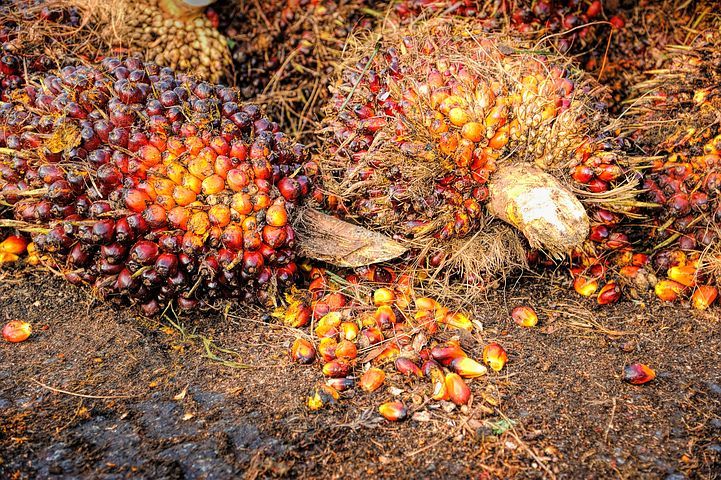
source: pixabay
Conclusion
In conclusion, palm oil is a widely used oil that is produced in many countries around the world, including Nigeria. It is rich in nutrients such as vitamins A and E, and has been shown to have many health benefits when consumed in moderation.
Palm oil is used in food, personal care products, biofuels, industrial applications, and animal feed.
Thank you all for reading. Hope to drop more for you all🤩🤩🤩😘😘😘😘
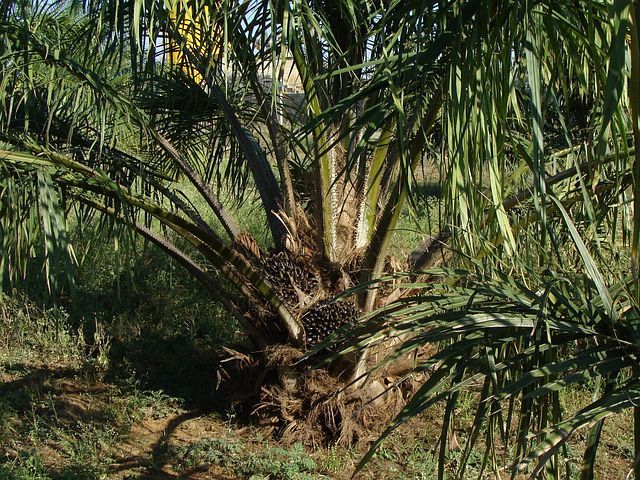
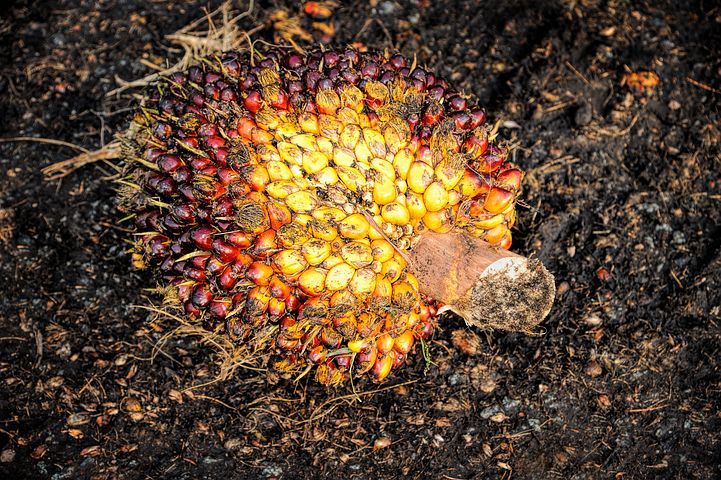
I was told by my Dad that in his early days, palm oil was a major source of revenue but so sad that our government have abandoned it